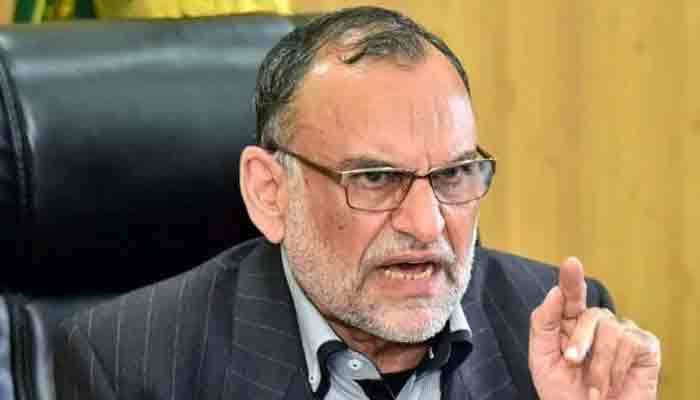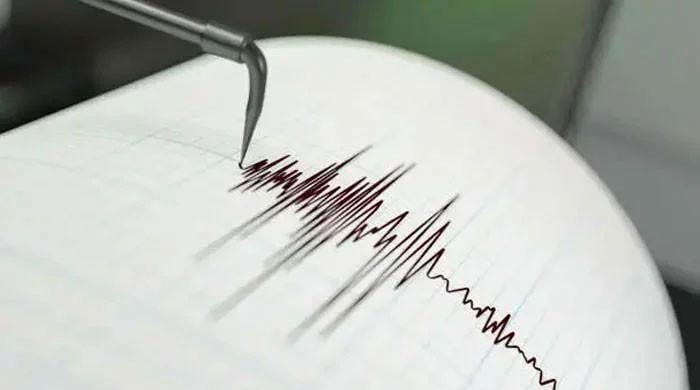Azam Swati levels serious allegations against ECP of taking bribes
ECP officials walk out of Senate standing committee meeting after Azam Swati's outburst
September 10, 2021

- Heated debate during Senate committee meeting on EVMs.
- Federal minister Azam Swati claims that the ECP has taken money from companies.
- Opposition senators asks Awati to give proof of his claims.
ISLAMABAD: Officials of the Election Commission of Pakistan (ECP) walked out of a meeting of the Senate Standing Committee on Parliamentary Affairs after federal minister Azam Swati levelled serious allegations against the commission of taking bribes.
The debate on the usage of electronic voting machines for the next general elections turned hostile Friday when a session of the committee was held under the chair of Senator Taj Haider.
Advisor to the Prime Minister on Parliamentary Affairs Dr Babar Awan said the government will not decide which machine will be used for voting.
"This will be decided by the election commission," he said. "The Ministry of Parliamentary Affairs wrote a letter to the ECP, asking whether it needed a budget."
Awan said the ministry had written to the ECP, asking whether it needed a budget, security or storage to hold the elections. "The ECP did not respond to the letter," he lamented.
It was then that a livid Azam Swati accused the ECP of taking money from companies that make electronic voting machines, said a source present in the meeting.
The Opposition senators said that Swati cannot accuse a constitutional body of taking bribes, and asked the senator to provide proof to back his claim.
Swati then added that such institutions conduct all elections through rigging and should be burned down. At this, the ECP officials walked out in protest.
After the meeting was disrupted, Senator Farooq H Naek lashed out at Swati, saying that the ECP should be removed from the Constitution and the government should conduct the elections itself.
"Whenever the ECP tries to become independent, they [government] start to have a problem with it," added Senator Azam Nazeer Tarar.
The committee's chairperson sent Senator Kamran Murtaza to convince the ECP officials to return to the meeting.
However, State Minister for Parliamentary Affairs Ali Muhammad Khan said the ECP officials were deeply upset and would not return to the meeting.
Senator Mustafa Nawaz Khokhar and Azam Swati also exchanged hot words, with the PPP senator asking the minister about the alleged bribe.
"Azam Swati should tell us who paid bribes to the ECP?" he asked. "Was it the PPP or the PML-N?"
A defiant Swati stuck to his guns, saying that he had said nothing wrong.
Committee rejects amendment on using EVMs
Senator Taj Haider presented an amendment for approval on EVMs. Azam Swati protested against Haider, accusing him of not allowing Senator Samina Mumtaz to cast her vote.
"You are not taking our lawmaker online so that she can cast her vote," he said. "We are walking out in protest," he added, and representatives of the government left the meeting.
The committee proceeded to vote on amendments to the Election Act in their absence. The committee shot down the use of electronic voting machines and also rejected an amendment relating to the I-voting of overseas Pakistanis.
The committee also rejected an amendment to the Act that wanted NADRA, instead of the ECP, to issue election lists and also rejected an amendment for Senate elections to be held via an open ballot as opposed to a secret one.
Govt had no response to ECP's solid reservations on EVMs: Shahbaz Sharif
PML-N President Shahbaz Sharif lashed out at the government, saying that while the PML-N had called over 100 meetings on electoral reforms when it was in power, the government couldn't handle one.
"Their consultations [amount to] imprisoning the Opposition when they ask questions and silencing the media," he tweeted.
He wondered how a government that does not demonstrate seriousness during a consultative meeting, be expected to take concrete decisions on electoral and administrative reforms.
"ECP officials walking out [in protest] over the ministers' attitude tells us of the government's attitude," he said. "How can a government that is unable to answer members of a committee logically expect us to put faith in its legislation and claims?" he wondered.
Sharif said the government does not have any answer to the logical, comprehensive, solid and technical reservations pointed out by the ECP on the EVMs.
He regretted how the government had "bulldozed" bills in the National Assembly a few months ago and today, forced the ECP members to walk out of a committee meeting.
"The government does not have reasoning to promote electronic voting, it only has threats," he said. "On rejecting the idea of EVMs, the government has resorted to threatening the ECP," he added.
Babar Awan says bills to be approved through joint session
Meanwhile, Babar Awan criticised the chairman of the senate committee for not allowing a government member to vote during the meeting.
"Senate Parliamentary Committee chairman has deprived Senator Samina Mumtaz of exercising her right of the vote after which the government members walked out of the meeting," he tweeted.
He said that the Opposition has been exposed after it voted against the EVM and overseas Pakistan's right to vote.
"We will get both the bills approved from the joint session of parliament," Babar Awan said.
EVMs cannot stop rigging, says ECP
On Friday, the Election Commission of Pakistan submitted a four-page letter to Taj Haider, the chairman of the senate’s standing committee on parliamentary affairs, which expressed its reservations regarding the proposed election amendment bills.
The ECP stated that it endorses the introduction of new technologies in the electoral process but has concerns about the process being pushed in “haste”.
“The Commission, while in favor of technology, believes that the technology to be used must be secured and sufficiently tested,” the letter argued, adding that the EVM should be subject to massive testing by procuring the machine on a small scale for a pilot project first.
The ECP also proposed that the selected machines be used in local government elections, by-elections and a few constitutions in the next general elections first and then on a large scale.
It further highlighted that with the usage of machines, elections will have to be held in a staggered manner rather than in a single day, which will require legal amendments.
“EVMs are offered as a defense against ballot stuffing and altering results,” the letter noted, “EVMs will not counter all types of frauds and open up the possibility of other more sophisticated types of fraud and manipulation of software and hardware.”
The Commissions also insisted that the Senate committee take into consideration the cost of EVMs. If a separate machine is used for the national assembly and the provincial assembly then at least 900,000 machines will be required for approximately 100,000 polling stations and 400,000 polling booths. “The system would cost an estimated Rs150 billion,” it added.











